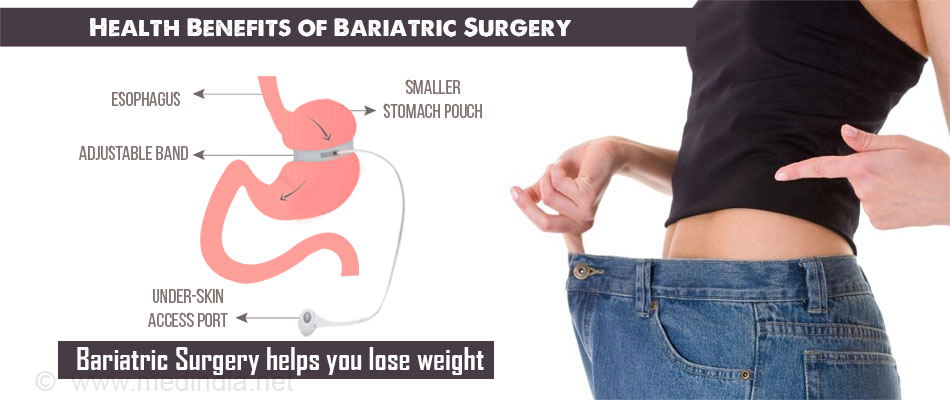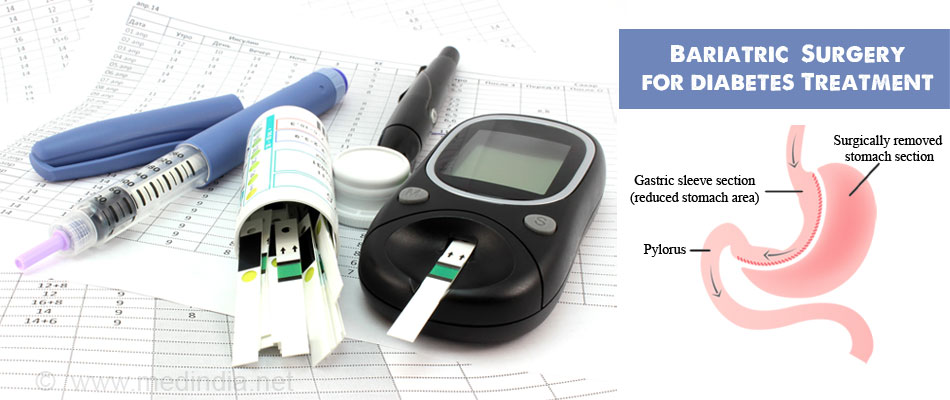- Bariatric Surgery - (https://www.niddk.nih.gov/health-information/health-topics/weight-control/bariatric-surgery/pages/overview.aspx)
- Estimate of Bariatric Surgery Numbers, 2011-2015 - (https://asmbs.org/resources/estimate-of-bariatric-surgery-numbers)
- Bariatric Surgery: Risks and Rewards - (https://www.ncbi.nlm.nih.gov/pmc/articles/pmc2729256/)
- Gastric Bypass Surgery - (http://www.mayoclinic.org/tests-procedures/bariatric-surgery/basics/why-its-done/prc-20019138)
- Bariatric Surgery Procedures - (https://asmbs.org/patients/bariatric-surgery-procedures)
- 7 Bariatric Surgery Benefits Besides Helping You Lose Weight - (https://health.clevelandclinic.org/2015/05/7-bariatric-surgery-benefits-besides-helping-you-lose-weight/)
Obesity - Overview
Obesity refers to a body mass index (BMI) of 30 or more. Body mass index measures the relation of a person’s weight to his height. Obesity may be classified as follows -
- Class I – BMI 30 to 35
- Class II – BMI 35 to 40
- Class III – BMI 40 and above
Classes II and III are severe forms of obesity, and hard to treat with just diet and exercise.
What is Bariatric Surgery?
Bariatric or weight loss surgery is undertaken to help reduce weight in severe cases of obesity, and to reduce the risk of potentially life threatening diseases related to obesity.

What are the Top 15 Health Benefits of Bariatric Surgery?
Bariatric surgery helps in weight loss, and alleviation of many of the health issues associated with obesity. Weight loss following bariatric surgery is typically expressed in terms of the percentage of excess weight shed by the patient.
Excess weight in a person refers to the number of pounds over and above the person’s ideal weight. Some of the main benefits of bariatric surgery include the following -
1. Improved Quality of Life
Obesity is associated with an impaired quality of life, with lots of physical limitations, feeling of tiredness and body pain. Many patients who have undergone weight loss surgery report a better quality of life following the procedure.
2. Improvement of Diabetes Mellitus
Obesity is one of the most important risk factors for the development of type 2 diabetes, and over 90 percent of type 2 diabetics are either overweight or obese.
Diabetes ranks as the leading cause of renal failure, and is responsible for lower-limb amputations not related to trauma, onset of blindness among adults, and is associated with an increased risk of heart disease high blood pressure, stroke, and nervous system disease.
The International Diabetes Federation has stated that bariatric surgery considerably improves glycemic control in obese persons having type 2 diabetes, especially in those unable to achieve effective control with lifestyle modifications and medications.
The American Diabetes Association recommends bariatric surgery as an option in persons with a BMI greater than 35, difficult to manage by conservative measures.

3. Improvement of Non-alcoholic Fatty Liver Disease (NAFLD)
Obesity is a major risk factor for the development of NAFLD or non-alcoholic steatohepatitis (NASH), which is one of the most common causes for chronic liver disease worldwide.
The mainstay of treatment of obesity in NAFLD is lifestyle modification and weight loss.
Bariatric surgery has been found to be one of the most effective ways of retarding progression of NAFLD.
4. Reduction of Hypertension
Obesity is linked to an increased incidence of high blood pressure (hypertension), and heart disease.
Following bariatric surgery, blood pressure became normal in some patients obviating the need for medications, and reduced the need for medications in many others.
5. Reduction of Hyperlipidemia
More than half of morbidly obese patients have dyslipidemia, and weight loss surgery led to a resolution of hyperlipidemia in about 60 percent of the patients.
In addition, bariatric surgery was associated with a significant reduction in risk of heart attack and stroke.

6. Alleviation of Joint pain and Osteoarthritis (OA)
Risk of developing knee OA was 0.1% with a BMI less than 20, but rose sharply to 13.6% with a BMI over 35.
Most obese patients with OA develop pain in the weight bearing joints, and lower limb and back pain.
In patients with OA of the knee, weight loss surgery provided dramatic relief from pain, as early as three months post-surgery. Incidence of back pain also significantly decreased following surgery.
7. Relief from Depression
Many persons with severe obesity suffer from depression due to a poor body image and social stigma. They avoid participating in activities that they may enjoy and consequently become isolated and depressed. Bariatric surgery goes a long way in improving the emotional health of such persons.
8. Resolution of Obstructive Sleep Apnea
Obstructive sleep apnea is characterized by snoring loudly, with long pauses in respiration during sleep. It is associated with an increased risk of heart attacks, blood pressure and inability to concentrate on work during the day.
Bariatric surgery considerably improves the symptoms of obstructive sleep apnea in over 85 percent of patients.

9. Relief from Gastroesophageal Reflux Disease (GERD)\
GERD or acid reflux is characterized by an incompetent lower esophageal sphincter, with splashing of stomach acid into lower esophagus. It leads to difficulty in swallowing, ulcers, scarring, and an increased incidence of esophageal cancer.
Weight loss surgery offers varying degrees of relief from this condition.
10. Risk of Cancer Reduction
Bariatric surgery reduces the incidence of various cancers including kidney, esophageal, colon, breast and uterine cancers.
11. Improved Chances of Conception
Improved fertility in women suffering from polycystic ovarian disease (PCOD)
12. Reduction in Chances of Varicose Veins
Reduction of venous stasis – which causes painful ulcers and discoloration of skin of lower legs.
13. Reduction in Chances of Headaches
- Relief from migraine headaches which can impact the quality of life
- Resolution of pseudo tumor cerebri symptoms – which include headache, dizziness, nausea and vision loss. Majority of patients experienced complete resolution of pseudo tumor cerebri symptoms following weight loss surgery.

14. Improved Self Image
Once you reduce weight you tend to look smarter and younger.
15. Improved Life Expectancy
Risk of mortality (death) was significantly reduced in persons with severe obesity who underwent bariatric surgery, compared to those who did not.
When is Bariatric Surgery Done?
- Extreme obesity with BMI of over 40
- BMI of 35 to 40 with serious health issues such as hypertension, diabetes or severe sleep apnea
- Some cases of BMI between 30 to 35 with serious weight related problems
- Failure to lose weight with diet, exercise and medications
What are the Types of Bariatric Surgery?
Bariatric surgery promotes weight loss by either limiting the quantity of food the stomach can hold, or by causing reduced assimilation (malabsorption) of food, or by a combination of both.
The major amount of weight loss is noticed within the first two years of surgery. Most weight loss procedures nowadays are done by minimally invasive techniques (laparoscopic surgery). The most commonly performed bariatric surgery procedures include -
Adjustable gastric band – In this procedure, a ring with an inflatable band on its inner aspect is positioned around the top portion of the stomach, so that a smaller gastric pouch is created.
The ring has a circular balloon inside that can be inflated or deflated by injecting salt solution from the outside, thus adjusting the diameter of the opening from the pouch to the remaining portion of the stomach. Gastric band surgery is reversible in case the desired results are not produced or if any problems occur.
Sleeve gastrectomy – A portion of the stomach is removed, leaving behind only a vertical banana shaped portion that is then closed by stapling. This procedure limits the amount of food that the stomach can hold, and makes one feel full sooner. This procedure is irreversible.
Gastric bypass (Roux-en-Y bypass) – This is considered the ‘gold standard’ of weight loss procedures. A small stomach pouch is created by separating the top of the stomach from the rest of the stomach using staples.
The next step involves division of the first part of the small intestine, with the lower end of the divided small intestine brought up and joined with the newly created small stomach pouch.
The surgery is then completed by joining the upper part of the divided small intestine to a more distal part of the small intestine, so that the digestive secretions from the bypassed stomach and proximal part of the small intestine will ultimately mix with the food.
Biliopancreatic diversion with duodenal switch (BPD with DS) - In this procedure, a smaller, tubular stomach pouch is first produced by removing a part of the stomach, very similar to the sleeve gastrectomy. In the second step, a larger portion of the small intestine is bypassed to reduce more of the absorptive surface, thus limiting even more the amount of food assimilated.
The BPD/DS is regarded as the most effective procedure to manage severe obesity complicated by diabetes.
Other procedures that are still in the investigational stage include ileal transposition and duodeno -jejunal bypass.
Complications of Bariatric Surgery
Weight loss surgery may be associated with complications, both immediate as well as long-term.
Immediate complications -
- Bleeding
- Adverse reactions to anesthesia
- Infection
- Blood clots
- Lung or breathing problems
- Rarely death
Delayed complications
- Obstruction of bowel
- Dumping syndrome, with nausea, vomiting, and diarrhea
- Cholelithiasis (gallstones)
- Hernias
- Low blood sugar levels (hypoglycemia)
- Malnutrition due to decreased absorption of food
- Gastric (stomach) perforation
- Stomach ulcers
- Rarely death

Bariatric Surgery – Statistics
- The number of weight loss surgeries performed has dramatically increased in the US and Europe. The health advantages and success rates of obesity surgeries could well be the reason for that rise. Given below are some interesting statistics regarding bariatric surgery.
- Obesity rates in the US are reported to be between 26 percent to 32 percent. If current trends continue, it is estimated that about 43% of Americans will be obese by 2018.
- According to available figures, the United States leads in the number of weight loss surgeries performed, going up from 158,000 in 2011 to nearly 200,000 in 2015. Sleeve gastrectomy was the most widely performed procedure.
- In Europe, France leads the pack in the number with the highest number of bariatric surgeries performed.
- According to statistics from 2011, the largest increase in obesity surgeries has been reported from Sweden with a 160% increase noticed from 2008 to 2011.
- In India too, a 2015 statistical report states that the number of bariatric surgeries performed has increased 10 times in the ten years from 2005. In 2014 alone, 10,000 surgeries were done.









